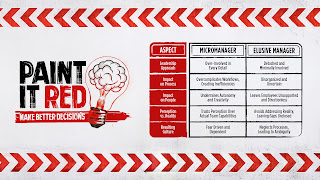Over-Complication: Culprit #2-Fear of Failure
Fear of failure is a
powerful force that drives overcomplication. When we’re afraid of making
mistakes, we tend to overcompensate. Crafting elaborate plans and overanalyzing
every decision, in an attempt to protect ourselves from risk. Ironically, this
effort to prevent failure often leads to stagnation, stress, and missed
opportunities.
7 Pillars of Paint It Red. Click Here
At its core, fear of
failure stems from uncertainty and a desire for control. Instead of making a
decision and adjusting as we go, we become fixated on eliminating all possible
risks before taking action.
Fear-driven complexity is
especially dangerous in business. Leaders who hesitate to make decisions until
every risk is accounted for can create bottlenecks, slow innovation, and erode
confidence. Employees may spend excessive time refining strategies instead of
executing them, leading to lost time and opportunities.
On a personal level, fear
of failure can make even simple tasks feel overwhelming. Overpreparing for
meetings, rewriting emails multiple times, or second-guessing every choice can
drain energy and hinder progress. The irony? The more we try to prevent failure,
the more we increase the likelihood of inefficiency and burnout. The antidote
to fear-driven complexity is shifting our mindset. Reframing failure as a
learning experience rather than a disaster.
Embracing
Time and Failure as the Ultimate Teachers
One of the most important
lessons in leadership is understanding that failure is not the enemy. It is a
teacher. True mastery and success come from patience, dedication, and learning
from setbacks.
Failure is often feared,
but it is an essential teacher on the road to success. Mistakes and bad
decisions are not the end of the world; they are opportunities to learn and
grow. Failure teaches resilience, sharpens decision-making, and provides
valuable insights that success alone cannot offer.
This perspective shift is
crucial for leaders. Instead of seeing failure as something to avoid at all
costs, strong leaders use it as a guide. They recognize the difference between
failure that results from effort and carelessness.
By embracing failure as
part of the leadership journey, we can reduce the tendency to overcomplicate
decisions. A leader who is comfortable with failure fosters a culture of
innovation. This mindset shift not only
leads to better decision-making but also creates a more resilient and adaptive
organization.
Conclusion
Fear of failure convinces
us that if we delay a decision long enough, the right answer will eventually
reveal itself. But in reality, avoiding a decision only prolongs the perception
of uncertainty and amplifies the anxiety that comes with it. Overcomplicating
choices in an attempt to eliminate all risk doesn’t lead to better outcomes. It
simply stretches out the discomfort of indecision.
The truth is, failure
isn’t as catastrophic as we imagine. More often than not, the real damage comes
from inaction, not imperfection. By recognizing that mistakes are part of the
process, we can break free from the cycle of avoidance.





Comments
Post a Comment